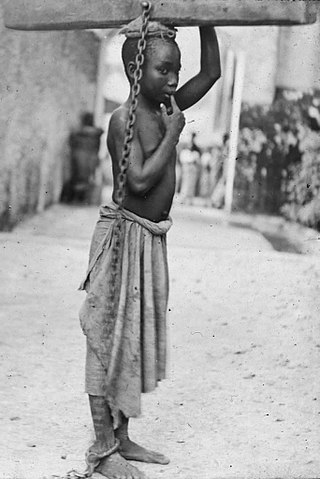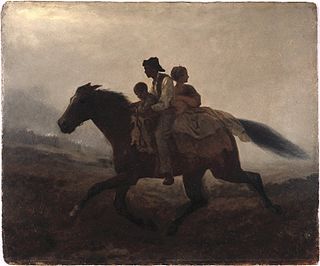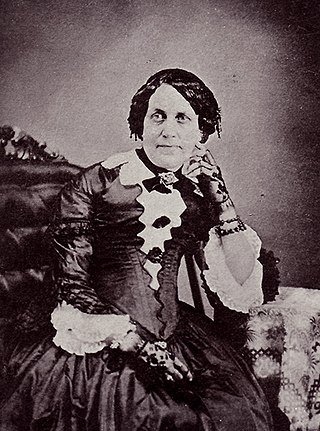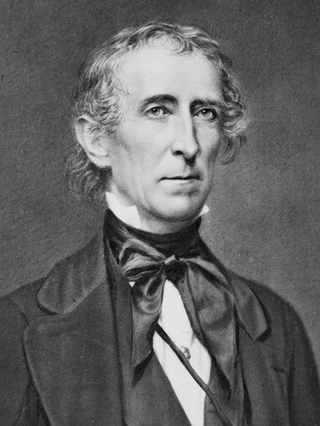
Abolitionism, or the abolitionist movement, is the movement to end slavery and liberate enslaved individuals around the world.

Presidential elections were held in the United States from November 1 to December 4, 1844. Democratic nominee James K. Polk narrowly defeated Whig Henry Clay in a close contest turning on the controversial issues of slavery and the annexation of the Republic of Texas. This is the only election in which both major party nominees served as Speaker of the House at one point, and the first in which neither candidate held elective office at the time.

Henry Clay Sr. was an American lawyer and statesman who represented Kentucky in both the U.S. Senate and House of Representatives. He was the seventh House speaker as well as the ninth secretary of state. He unsuccessfully ran for president in the 1824, 1832, and 1844 elections. He helped found both the National Republican Party and the Whig Party. For his role in defusing sectional crises, he earned the appellation of the "Great Compromiser" and was part of the "Great Triumvirate" of Congressmen, alongside fellow Whig Daniel Webster and Democrat John C. Calhoun. Clay died at the age of 75 in 1852.

John Caldwell Calhoun was an American statesman and political theorist who served as the seventh vice president of the United States from 1825 to 1832. Born in South Carolina, he adamantly defended American slavery and sought to protect the interests of white Southerners. Calhoun began his political career as a nationalist, modernizer and proponent of a strong federal government and protective tariffs. In the late 1820s, his views changed radically, and he became a leading proponent of states' rights, limited government, nullification, and opposition to high tariffs. Calhoun saw Northern acceptance of those policies as a condition of the South's remaining in the Union. His beliefs heavily influenced the South's secession from the Union in 1860 and 1861. Calhoun was the first of two vice presidents to resign from the position, the second being Spiro Agnew, who resigned in 1973.

The American Colonization Society (ACS), initially the Society for the Colonization of Free People of Color of America, was an American organization founded in 1816 by Robert Finley to encourage and support the repatriation of freeborn people of color and emancipated slaves to the continent of Africa. It was modeled on an earlier British Committee for the Relief of the Black Poor's colonization in Africa, which had sought to resettle London's "black poor". Until the organization's dissolution in 1964, the society was headquartered in Room 516 of the Colorado Building in Washington, D.C.

The Republic of Texas was annexed into the United States and admitted to the Union as the 28th state on December 29, 1845.

The Fugitive Slave Act or Fugitive Slave Law was a law passed by the 31st United States Congress on September 18, 1850, as part of the Compromise of 1850 between Southern interests in slavery and Northern Free-Soilers.

In the United States, fugitive slaves or runaway slaves were terms used in the 18th and 19th centuries to describe people who fled slavery. The term also refers to the federal Fugitive Slave Acts of 1793 and 1850. Such people are also called freedom seekers to avoid implying that the enslaved person had committed a crime and that the slaveholder was the injured party.

The 1844 Whig National Convention was a presidential nominating convention held on May 1, 1844, at Universalist Church in Baltimore, Maryland. It nominated the Whig Party's candidates for president and vice president in the 1844 election. The convention selected former Senator Henry Clay of Kentucky for president and former Senator Theodore Frelinghuysen of New Jersey for vice president.

Proslavery is support for slavery. It is sometimes found in the thought of ancient philosophers, religious texts, and in American and British writings especially before the American Civil War but also later through the 20th century. Arguments in favor of slavery include deference to the Bible and thus to God, some people being natural slaves in need of supervision, slaves often being better off than the poorest non-slaves, practical social benefit for the society as a whole, and slavery being a time-proven practice by multiple great civilizations.
Zephaniah Kingsley Jr. was an English-born planter, merchant and slave trader who moved as a child with his family to the Province of South Carolina and enjoyed a successful mercantile career. He built four plantations in the Spanish colony of Florida near what is now Jacksonville, Florida. He served on the Florida Territorial Council after Florida was acquired by the United States in 1821. Kingsley Plantation, which he owned and where he lived for 25 years, has been preserved as part of the Timucuan Ecological and Historic Preserve, run by the United States National Park Service. Finding his large and complicated family progressively more insecure in Florida, he moved them to a vanished plantation, Mayorasgo de Koka, in what was then Haiti but soon became part of the Dominican Republic.

The presidency of Martin Van Buren began on March 4, 1837, when Martin Van Buren was inaugurated as 8th President of the United States, and ended on March 4, 1841. Van Buren, the incumbent vice president and chosen successor of President Andrew Jackson, took office after defeating multiple Whig Party candidates in the 1836 presidential election. A member of the Democratic Party, Van Buren's presidency ended following his defeat by Whig candidate William Henry Harrison in the 1840 presidential election.

The presidency of John Tyler began on April 4, 1841, when John Tyler became the 10th President of the United States upon the death of President William Henry Harrison, and ended on March 4, 1845. He had been Vice President of the United States for only 31 days when he assumed the presidency. Tyler was the first to succeed to the office without being elected to it. To forestall constitutional uncertainty, Tyler took the presidential oath of office on April 6, assumed full presidential powers, and served out the balance of Harrison's four-year term, a precedent that would govern future extraordinary successions and eventually become codified in the Twenty-fifth Amendment. He was succeeded by James Polk of the Democratic Party.
The Liberty Party was an abolitionist political party in the United States before the American Civil War. The party experienced its greatest activity during the 1840s, while remnants persisted as late as 1860. It supported James G. Birney in the presidential elections of 1840 and 1844. Others who attained prominence as leaders of the Liberty Party included Gerrit Smith, Salmon P. Chase, Henry Highland Garnet, Henry Bibb, and William Goodell. They attempted to work within the federal system created by the United States Constitution to diminish the political influence of the Slave Power and advance the cause of universal emancipation and an integrated, egalitarian society.

John Tyler was the tenth president of the United States, serving from 1841 to 1845, after briefly holding office as the tenth vice president in 1841. He was elected vice president on the 1840 Whig ticket with President William Henry Harrison, succeeding to the presidency following Harrison's death 31 days after assuming office. Tyler was a stalwart supporter and advocate of states' rights, including regarding slavery, and he adopted nationalistic policies as president only when they did not infringe on the states' powers. His unexpected rise to the presidency posed a threat to the presidential ambitions of Henry Clay and other Whig politicians and left Tyler estranged from both of the nation's major political parties at the time.
Like most contemporaries, John Quincy Adams's views on slavery evolved over time. He never joined the movement called "abolitionist" by historians—the one led by William Lloyd Garrison—because it demanded the immediate abolition of slavery and insisted it was a sin to enslave people. Further, abolitionism meant disunion and Adams was a staunch champion of American nationalism and union.

In the United States, abolitionism, the movement that sought to end slavery in the country, was active from the colonial era until the American Civil War, the end of which brought about the abolition of American slavery, except as punishment for a crime, through the Thirteenth Amendment to the United States Constitution.

National conventions of the Free Soil and Liberty parties met in 1847 and 1848 to nominate candidates for president and vice president in advance of the 1848 United States presidential election. These assemblies resulted in the creation of the national Free Soil Party, a union of political abolitionists with antislavery Conscience Whigs and Barnburner Democrats to oppose the westward extension of slavery into the U.S. territories. Former President Martin Van Buren was nominated for president by the Free Soil National Convention that met at Buffalo, New York on August 9, 1848; Charles Francis Adams Sr. was nominated for vice president. Van Buren and Adams received 291,409 popular votes in the national election, almost all from the free states; his popularity among northern Democrats was great enough to deny his Democratic rival, Lewis Cass, the crucial state of New York, throwing the state and the election to Whig Zachary Taylor.

Slavery as a positive good in the United States was the prevailing view of Southern politicians and intellectuals just before the American Civil War, as opposed to seeing it as a crime against humanity or a necessary evil. They defended the legal enslavement of people for their labor as a benevolent, paternalistic institution with social and economic benefits, an important bulwark of civilization, and a divine institution similar or superior to the free labor in the North.

















